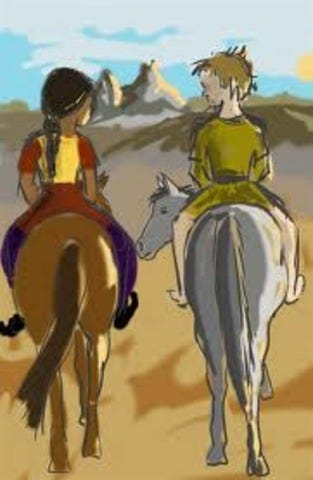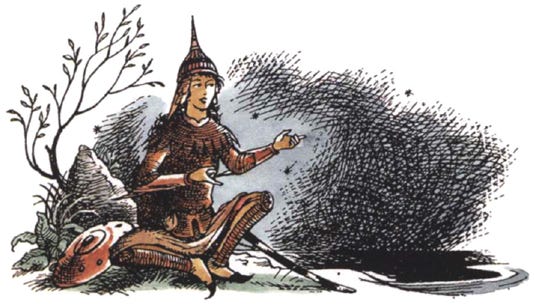God, grant me the serenity to accept the things I cannot change, the courage to change the things I can, and the wisdom to know the difference.
One sentence, three clauses, 27 words. Who knew that such a short prayer could be so profound. The quote I want to look at this week from The Horse and His Boy reminds me of this prayer. The Serenity prayer, as it is titled, requires great humility and for us to often push against many of our natural inclinations. We often want control over everything. We want knowledge of everything. We don’t like to think that some things are simply beyond our ability to influence or outside of the role we are to play. If no one else struggles with this, the rest of the article will simply be for myself, but I suspect I am not alone in my desire to creep outside the path God has planned for me.
The Horse and His Boy is in a much different setting than most of the other books in the series since the events of the book take place almost entirely outside the realm of Narnia. However, it is not because the book is set in our world but rather in a separate nation that neighbors Narnia. In fact, the events of the story occur in the Golden Age of Narnia during the reigns of the Pevensie kings and queens, and some of our Narnian monarchs play crucial roles in the plot of the story.
My favorite quote from this book is not spoken by or to one of the Pevensies but is delivered by our deity-lion Aslan to our new protagonist, Shasta. Shasta is the Boy referenced in the book’s title and the story follows his adventure alongside the horse, Bree (notice how the title suggests the inverse relationship you would expect between beast and man) and their companions, Aravis and Hwin, female counterparts to our title characters. The plot of The Horse and His Boy has many twists and turns, and our quote comes at a particularly turbulent time for Shasta. He finds himself forced to leave all three of his cohorts, who are not in great conditions themselves, and embark on a dire mission.
When Shasta finds himself abandoned, he is joined by what he calls a “Large Voice”. Not being a Narnian himself and knowing very little about the wider world that he has only recently entered, Shasta is very disturbed by this stranger. The Voice is Aslan’s and the reader is likely to pick up on this before it is officially revealed in the story. Shasta is questioning this powerful Voice as he walks along the path and learns that the Voice is largely responsible for his current predicament. In fact, Shasta learns that Aslan is the catalyst for every major event in his entire life. While hearing how all these critical events have come to pass, Shasta questions the Voice about why he wounded Aravis earlier that night. This is when Aslan replies, “Child, I am telling you your story, not hers. I tell no story to anyone but their own.”
This reply is the quote I have chosen from this book. I strongly recommend that you read the entire book if you have not because you can really sympathize with Shasta for wanting to know so much more about the bizarre events around him. However, Aslan redirects Shasta’s curiosity back to where it should be. Shasta needs to be focused on the task before him. He needs to be focused on the future. He needs to be focused on what he is going to do to get out of his predicament. And above all, Shasta needs to be focused on what this seemingly all-powerful Voice is revealing to him. Now do you see why the quote reminds me of the Serenity Prayer?
“God, grant me the serenity to accept the things I cannot change,” Shasta is concerned about something that we would find very reasonable from a Christian perspective. He is even putting others above himself, but I think he is corrected because he is asking Aslan about the past, which he has no ability to change, at the expense of the moment. Boy, do I struggle with this? I am very prone to worrying about things outside my sphere of influence. I often contemplate things of the past, which has its place because we need to learn from the mistakes of the past to avoid repeating them, but I occasionally do so at the expense of the present moment. Of all the higher aims Christians are called to, I find staying in the present moment one of the most difficult. Bottom line, I feel ya Shasta. I feel ya.
“…the courage to change the things I can,” Aslan is forced to remind Shasta that he is on a mission. Shasta is receiving a metaphorical firehose of information about his entire life in the dialogue with the Voice but don’t forget the dire mission we are in the middle of. It is one thing to leave our concerns of what we do not have control over, but this second part of the Serenity prayer calls for additional virtue to address the concerns we can impact. After concluding his conversation with Aslan, Shasta is given the courage to complete his task.
“… and the wisdom to know the difference.” An underlying message in Aslan’s quote to Shasta is that he will come to understand why needs to be told his own story, and why he does not need to know Aravis’ story. This final phrase in the Serenity Prayer implies that we are going to experience both relevant and irrelevant events in our lives and we must use our reason and virtue in deciding a proper response. Shasta is a much different character at the end of this book than at the beginning. I think the biggest difference we see is his embrace of the gift of wisdom given by Aslan in this simple message.






Have you ever heard “Shasta’s Lament” by Sarah Sparks? I think you’d enjoy it!